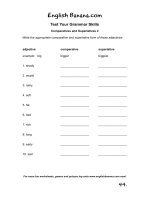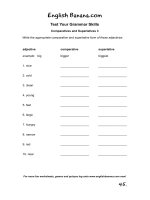Comparatives and superlatives
Bạn đang xem bản rút gọn của tài liệu. Xem và tải ngay bản đầy đủ của tài liệu tại đây (112.11 KB, 8 trang )
Unit 28 (Unidad 28)
Comparatives and superlatives
(Los comparativos y superlativos)
Level 1
1.1 Comparison of adjectives indicating inequality and equality (Comparaci
´
on de
adjetivos indicando desigualdad e igualdad)
1.2 Comparison of adverbs indicating equality and inequality (Comparaci
´
on de
adverbios indicando igualdad y desigualdad)
1.3 Superlatives + adjectives (Superlativos + adjetivos)
1.4 Other features (Otros detalles)
1.1 Comparison of adjectives indicating inequality
and equality
i The comparison of adjectives is formed by using m´as (more) and menos (less) before
the adjective. Que (than) is used after the adjective.
Examples
Carlos es m´as r´apido que t´u Carlos is faster than you
Este chico es m´as listo que su hermano This boy is smarter than his brother
Son menos ruidosos que las muchachas They are less noisy than the girls
Es un hotel menos tranquilo que el otro It’s a less quiet hotel than the other one
negro / m´as negro / menos negro black / blacker / less black
capaz / m´as capaz / menos capaz capable / more capable / less capable
ii Four adjectives, in addition to their regular comparatives, have other, and, in two
cases, preferred, forms:
Positive Comparative
bueno (good) mejor (better)
malo (bad) peor (worse)
grande (big, large) mayor (bigger, larger)
peque˜no (small) menor (littler, smaller)
Examples
Esta novela es mejor que la otra This novel is better than the other one
Isabel es peor estudiante que Mar´ıa Isabel is a worse student than Mar´ıa
261
ASTUDENT GRAMMAR OF SPANISH
Tu ni ˜na es mayor que la m´ıa Your girl (daughter) is bigger than mine
Mi prima es menor que yo My cousin is smaller than me
iii Comparison of adjectives (indicating equality)
Tan (as/so) is used here, followed by como (as):
Es tan abusado (M)/listo como su pap´a(M)/
padre
He’s as smart as his father
Es tan caro como el caviar It’s as dear as caviar
1.2 Comparison of adverbs indicating equality
and inequality
i Equality. As with adjectives, tan + como is used:
Habla espa˜nol tan bien como su profesora She speaks Spanish as well as her teacher
La ni˜na escribe tan perfectamente como su hermano
mayor
The little girl writes as perfectly as her
older brother
ii Inequality. M´as (more) and menos (less) are used here, followed by que (than), as
with comparisons of adjective:
Corre m´as r´apidamente que yo She runs faster than me
Lee m´as lentamente que su primo She reads more slowly than her cousin
Lo arregla menos f´acilmente que yo He sorts it out less easily then me
Trabaja menos seriamente que su hijo She works less seriously than her son
1.3 Superlatives + adjectives
i The superlative is usually expressed by placing the definite article with the
comparative:
Son los m´as inteligentes They are the most intelligent
Este hotel es el m´as caro de la ciudad This hotel is the dearest in town
Este es el peor jugador del equipo This is the worst player in the team
El tiempo que hace es el mejor del a˜no Theweather is the best this year
ii De follows a superlative in cases where in English we would have in:
Te xas es el estado m´as extenso de los Estados Unidos Texas is the biggest state in the United
States
El Nilo es el r´ıo m´as largo del mundo The Nile is the longest river in the world
1.4 Other features
i Frequently, menos is replaced by no + tan + adjective or adverb + como:
No es tan alto como su hermana He’s not so tall as his sister
No trabaja tan seriamente como yo He doesn’t work as seriously as me
262
28 Comparatives and superlatives
ii M´as de and menos de are used before quantities and numbers:
Hay m´as de un mill´on de libros en aquella biblioteca There are more than a million books in
that library
¿Por qu´e compras menos de dos kilos? Why do you buy less than two kilos?
iii Tanto . . . como, with its three other forms (tanta / tantos / tantas . . . como), as much /
many . . . as,isused with equality of nouns:
No tengo tanto pan como Jorge Ihaven’t got as much bread as Jorge
No traes tantos discos como Elena Yo u don’t bring as many discs as Elena
Hay tanta mantequilla como en casa There’s as much butter as at home
Tienes tantas cucharas como yo Yo uhaveasmany spoons as me
Exercises
Level 1
i Make three separate sentences from the two available. Follow the example
Juan disfruta mucho. Armando disfruta poco > 1. Armando disfruta menos que Juan +
2. Juan disfruta m´as que Armando + 3. Armando no disfruta tanto como Juan
a Alicia se divierte mucho. Rosa se divierte poco
b Los muchachos descansan mucho. Yo descanso poco
c El doctor se cansa mucho. Su hijo se cansa poco
d Los ni˜nos gritan mucho. Juanito grita poco
e Me preocupo mucho. T´utepreocupas poco
f La se˜nora trabaja mucho. Marta trabaja poco
g Tus amigas platican (M)/hablan mucho. T´u platicas/hablas poco
h Teresa gasta mucho. Sus hijos gastan poco
i Ellos comen mucho. Yo como poco
j La ni˜na se queja mucho. Su hermano se queja poco
ii Put the following sentences in the negative. Use tanto/a/os/as.
Example
Escrib´ı dos cartas. Juan escribi´o cuatro cartas > No escrib´ı tantas cartas como Juan
a En mi pa´ıs hay muchas monta˜nas. En el tuyo hay menos
b Alicia salta tres metros. Lupe salta dos
c En las ciudades hay mucha niebla. En los pueblos hay poca niebla
d Luis toma mucha leche. Alicia toma poca
e Practicamos varios deportes. Luc´ıa practica pocos
f Ech´eaperder mucho papel. Rosa ech´oaperder poco
g Jorge tiene mucho dinero. Nosotros tenemos poco
h En mi coche hay mucho lugar. En el tuyo hay poco
i Elena recibi´omuchos regalos. Tere recibi´o pocos
j Mis sobrinos comieron muchas aceitunas. Los tuyos comieron pocas
iii Paired activity
Objective –Topractice statements of comparison
Method –Aand B ask each other questions using ten expressions such as tan ...como,
m´as ...que, menos ...que, tantos ...
263
ASTUDENT GRAMMAR OF SPANISH
Examples
A: ¿Eres m´as listo que yo?
B: No soy tan listo como t ´u
A: ¿Mi hermana es menos inteligente que yo?
B: Tu hermana no es tan inteligente como t´u
Level 2
2.1 Como = like or as in English (Como = ...)
2.2 Que replaced by de lo que (Que reemplazado por...)
2.3 Cuanto ...tanto
2.4 Superlatives of adverbs (Superlativos de adverbios)
2.5 Absolute superlative of adjectives (Superlativo absoluto de adjetivos)
2.6 Absolute superlative of adverbs (Superlativo absoluto de adverbios)
2.1 Como = like or as in English
Corre como un conejo She runs like a rabbit
Lucha como un tigre He fights like a tiger
Hazlo como lo quieras Do it as you wish
2.2 Que replaced by de lo que
i When each part of the comparison contains a different verb, que is replaced by de lo
que:
Es menos f´acil de lo que dice It’s less easy than he says
El examen fue m´as dif´ıcil de lo que hab´ıamos temido Theexamination was more difficult than
we had feared
Es m´as tonto de lo que parece He’s dumber than he looks
ii This is also true with nouns:
Tiene menos dinero de lo que dice She has less money than she says
Ha cometido m´as delitos de lo que piensas He’s committed more crimes than you
think
2.3 Cuanto ...tanto
i Cuanto ...tanto followed by any comparative are used in correlatives to express
ratio, corresponding to the English the...the:
Cuanto m´as viejo es el vino, tanto mejor The older the wine, the better it is
Cuanto m´as largo es el d´ıa tanto m´as corta la noche The longer the day, the shorter the night
ii Tanto m ´as/menos ...cuanto que corresponds to all the more/less ...because . . . :
El delito es tanto m´as grave cuanto que acaba de
salir de la c´arcel
The crime is all the more serious because
he’s just come out of jail
264
28 Comparatives and superlatives
Estoy tanto menos satisfecho de su conducta cuanto
que le di dinero
Iamall the less satisfied with her conduct
because I gave her money
2.4 Superlatives of adverbs
The superlative of adverbs is formed in the same manner as those of adjectives:
Los mejores alumnos son los que hablan menos The best pupils are those who speak least
Esa era la respuesta que menos esperaba o´ır That was the reply I was least expecting to
hear
Amo el mar cuando m´as alto suben las olas Ilove the sea when the waves rise up even
more
2.5 Absolute superlative of adjectives
i The absolute superlative of adjectives, when formed regularly, is made by adding
-´ısimo.Itisthen varied like any adjective ending in o. This ending has an intensive
value, equivalent to the English very or most.Aswith the common Italian -issimo, and
the occasional -issime in French, this form derives from the Latin.
Ejemplos
El acero es dur´ısimo Steel is very hard/tough
El oro es pur´ısimo Gold is very/most pure
La casa es alt´ısima The house is very tall
Las flores son hermos´ısimas Theflowers are really lovely
Es una construcci´on fe´ısima It’s a really ugly building
ii The following distinctions are to be observed in the formation of the absolute
superlative of adjectives:
aIfthe positive adjective ends in a consonant, it receives -
´
ısimo without changing,
unless the final consonant is z,which changes to c before i:
h´abil/h´abil´ısimo skillful / most skillful
feliz/felic´ısimo happy / very happy
feroz/feroc´ısimo fierce / most fierce
bAfinal vowel or diphthong is omitted before -
´
ısimo. When the adjective ends in two
vowels, as in io, both are omitted, although it could be maintained that the i remains
butreceives a written accent, and therefore a spoken stress.
importante/important´ısimo important / most important
limpio/limp´ısimo clean / very clean
sucio/suc´ısimo dirty / very dirty
amplio/ampl´ısimo wide / widest, full/fullest
pobre/pobr´ısimo poor / very poor
Ejemplos
una rec´amara (M) ampl´ısima avery spacious bedroom
una mujer pobr´ısima avery poor woman
Tiene manos limp´ısimas She’s got very clean hands
265









